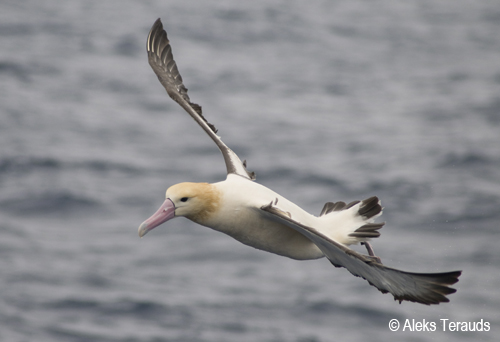Erica Donnelly-Greenan (Oikonos Ecosystem Knowledge, Santa Cruz, California, U.S.A.) and colleagues have published in the open-access journal Marine Ornithology on plastic ingestion by globally Vulnerable Short-tailed Albatrosses Phoebastria albatrus.
The paper’s abstract follows:
“We investigated the sex, age, body condition, and ingested plastics in six Short-tailed Albatross Phoebastria albatrus, bycaught or opportunistically salvaged in US North Pacific groundfish fisheries. Necropsies revealed a 1:1 sex ratio, and a 2:1 juvenile (≤4 years of age) to adult (≥5 years of age) ratio, with five birds in healthy body condition and four in active molt. Of the six birds examined, two females (one adult, one juvenile) and two males (both juvenile), contained ingested plastics. Of the four birds with plastic, the number and mass of total plastic per bird was variable (number: mean 4.75, SD 2.1; mass: mean 0.2921 g, SD 0.3250 g). Plastics were categorized as fragments (n = 11), sheets (n = 4), foam (n = 2), and rubber (n = 2). Fragments were the most numerous type, occurring in all four birds that had ingested plastic and accounting for 57.9% of the plastic items and 90.5% of the plastic mass (dry weight). We documented greater incidence of ingested plastic in the ventriculus (75.0%) than in the proventriculus (16.7%). The overall plastic incidence was 75.0% in juveniles and 50.0% in adults. While this research provides quantitative evidence that Short-tailed Albatross juveniles and adults ingest plastics, additional analyses are needed to fully quantify the prevalence of plastic ingestion and to investigate potential persistent organic pollutants and plasticizers in Short-tailed Albatross”.

Short-tailed Albatross at sea, photograph by Aleks Terauds
Reference:
Donnelly-Greenan, E., Hyrenbach, D., Beck, J., Fitzgerald, S., Nevins, H. & Hester, M. 2018. First quantification of plastic ingestion by Short-tailed Albatross Phoebastria albatrus. Marine Ornithology 46: 79-84.
John Cooper, ACAP Information Officer, 06 April 2018

 English
English  Français
Français  Español
Español